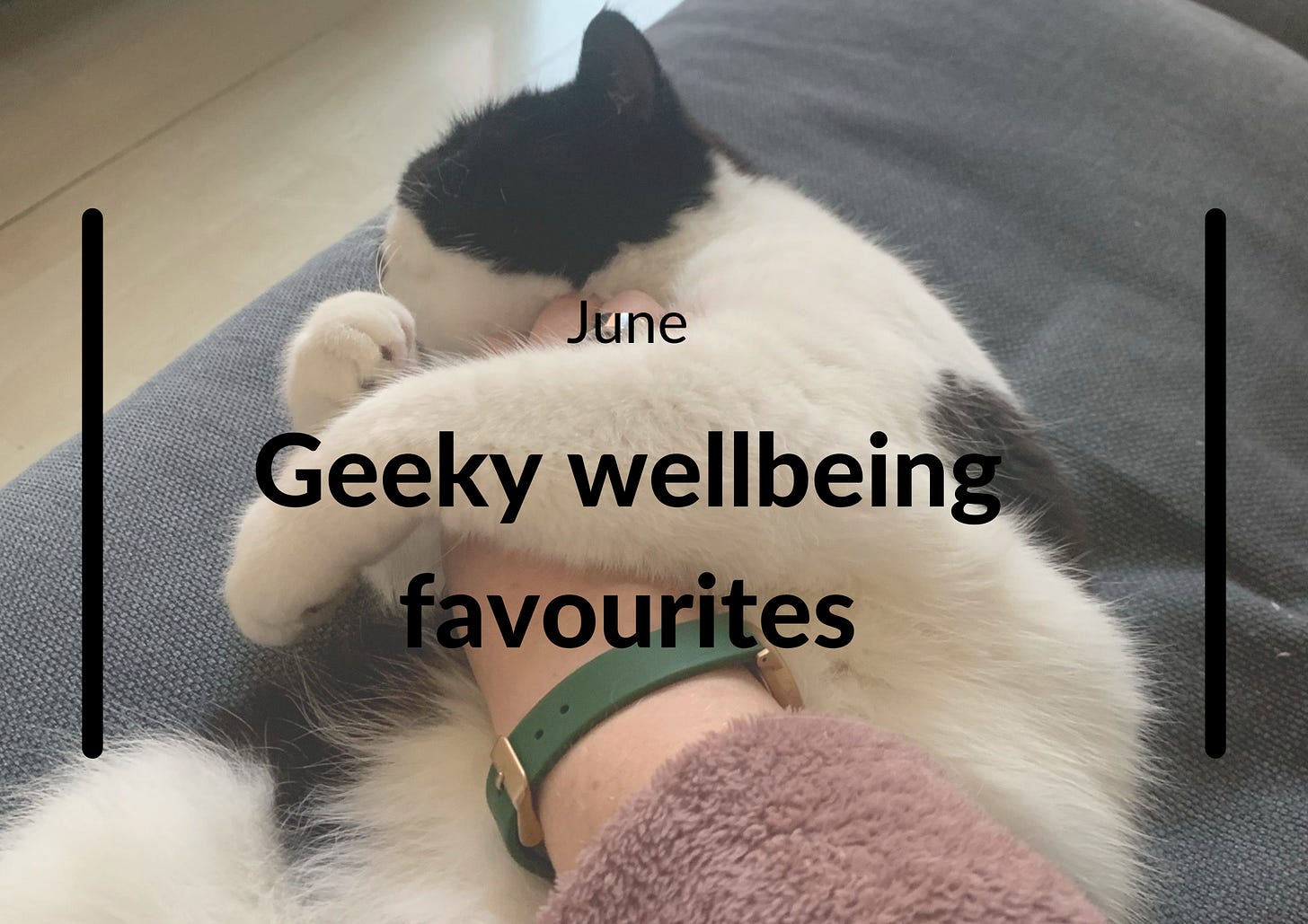Geeky wellbeing favourites: June
Fearology, conquering your stress and the joys of a therapy cat
It is safe to say that 2021 has been the year of stress and fear – and I’m sure I’m not alone in this. Personal circumstances, combined with yet another year of pandemic and lockdown, have kept me muttering that I’m ready for 2022 already (is there a meme for this? I bet someone has made a meme).
In the context of yoga and wellbeing, it’s a fascinating subject. After all, yoga is a tool for better living mainly through its effects on the stress/fear response – bringing back balance by calming the nervous system down, which cascades into all parts of the body, including the immune system (which, lets face it, must be a good thing during a pandemic).
So this month we focus on fear, and the ways we can work to live better with it. Plus, there are two cats in this post. Enjoy!
Listen
If you’ve never listened to Ologies, you’re in for a treat. Every week, Alie Ward speaks to a specialist – or -ologist – who gives the download on their particular area of expertise and how they got there. There is something here for everyone, with topics as random as virology, condorology, gastroegyptology (making bread with ancient egyptian yeast) and, my personal favourite, desairology (mortuary make-up).
The most popular episodes, and the ones I recommend in the context of this month’s newsletter, is a two-part on fearology (yes, that is apparently a real word). Goodies include what is fear and its difference from stress, the impact it has on the body (spoiler: not good) and techniques everyone can use to when the brain goes into overdrive. Name it and conquer it!
Read
Not quite fear but certainly in the anxiety and general mental health realm, Lost Connections is, for me, a fabulous example of how popular science books should be written. Is medication really the answer to our depression and anxiety? Or is there something problematic about modern living?
The chapter on how to cope with the misery you get when you compare yourself to others was for me life-changing and something that I keep trying to practice to stay sane.
Read a bit more
This article has done the rounds on social media already, but just in case you missed it.
Practice
I tell kitty he’s a therapy cat but he doesn’t really listen. But sometimes, when I’m stressed, I place my head on his body and the gentle sound and vibration from his purring is incredibly therapeutic.
So I promise, I’m not being lazy here and picking one of Melanie’s yoga nidras again – this is a special yoga nidra with cat purrs! At the peak of stress a couple of weeks ago I knew I had to reach out for this one, and it didn’t disappoint. But warning: if you have a cat, this might make you chuckle a bit during the nidra (I did anyway). Apparently cat purrs are as individual as the cats themselves.
Coming up
Living a life that is not dominated by stress and fear demands tools for self-care and resilience. Although my practice is generally routed in yoga and mindfulness, I’ve become really intrigued by stoicism (which, to be fair, actually shares a lot of similarities with mindfulness).
Want to know more? Paths to flourishing is the first ever women’s conference on stoicism and it’s happening online this Saturday, June 5th. It includes talks and workshops on how modern stoicism can help to promote inner care, resilience and happiness. There’s even a journalling workshop, which sounds like fun.
And if you identify as a man, don’t worry – men are welcome to attend. By labelling it as a women’s conference, the organisers wanted to ensure that women’s voices in stoicism were no longer marginalised.
Yoga science highlights
Vrksasana (tree pose) helps to improve balance in post-menopausal women with osteoporosis. Although important to note that this was a small study and that a similar effect would likely be seen with any one-leg balance pose (but who doesn’t like vrksasana?)
Feeling stressed? Try sheetali pranayama – a (small) recent study finds that it reduces heart rate, lowers blood pressure and activates the parasympathetic nervous system to bring that sense of calm and relaxation (in essence having the same effect as most slow breathing practices)
More evidence of the benefits of yoga on stress – a randomised controlled trial with 202 students found that an ashtanga-based yoga practice improved symptoms of distress, wellbeing and sleep quality. The effects lasted beyond the end of the study.
From the blog this month
What is the vagus nerve (and why should you care) – The main parasympathetic nerve, the vagus nerve is everyone’s favourite nerve. And yoga is her best friend.
Yoga and mHealth, the perfect recipe for empowerment? – Digital health can be a beautiful way to deliver the tools we all need to take a more active role in our health and wellbeing. So what happens when you combine it with yoga practices?
Why is most yoga research a bit shit? – A more polite variant of this question recently came up in my pranayama teacher training. Here are three reasons why.
What having a vitamin B12 deficiency taught me about behavioural science – The one where I learn first hand what it takes to change health behaviours.
In case you missed…
On the subject of stress and fear:
Yoga nidra makes me happy (or just less sad) – evidence that yoga nidra could help when you’re feeling a bit shit (even better if there’s cat purrs involved although I suspect that wasn’t in the study)
How yoga nidra could help tip the balance in an anxious mind – here’s all the evidence
Why I teach, and yoga as a tool for empowerment – use it to conquer your stress and fears







